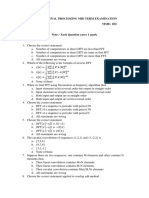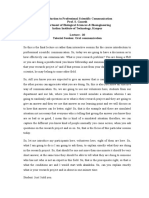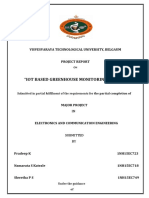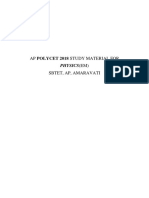0 ratings0% found this document useful (0 votes)
85 viewsNew Microsoft Office Excel Worksheet
New Microsoft Office Excel Worksheet
Uploaded by
Siva Kumar1. Appending zeros to a sequence increases its length and is called zero padding.
2. The techniques used to transform analog to digital filters are impulse invariant and bilinear transformation.
3. The process of reducing the sampling rate by a factor D is called decimation.
Copyright:
© All Rights Reserved
Available Formats
Download as XLSX, PDF, TXT or read online from Scribd
New Microsoft Office Excel Worksheet
New Microsoft Office Excel Worksheet
Uploaded by
Siva Kumar0 ratings0% found this document useful (0 votes)
85 views3 pages1. Appending zeros to a sequence increases its length and is called zero padding.
2. The techniques used to transform analog to digital filters are impulse invariant and bilinear transformation.
3. The process of reducing the sampling rate by a factor D is called decimation.
Original Description:
wqewe
Original Title
New Microsoft Office Excel Worksheet (2)
Copyright
© © All Rights Reserved
Available Formats
XLSX, PDF, TXT or read online from Scribd
Share this document
Did you find this document useful?
Is this content inappropriate?
1. Appending zeros to a sequence increases its length and is called zero padding.
2. The techniques used to transform analog to digital filters are impulse invariant and bilinear transformation.
3. The process of reducing the sampling rate by a factor D is called decimation.
Copyright:
© All Rights Reserved
Available Formats
Download as XLSX, PDF, TXT or read online from Scribd
Download as xlsx, pdf, or txt
0 ratings0% found this document useful (0 votes)
85 views3 pagesNew Microsoft Office Excel Worksheet
New Microsoft Office Excel Worksheet
Uploaded by
Siva Kumar1. Appending zeros to a sequence increases its length and is called zero padding.
2. The techniques used to transform analog to digital filters are impulse invariant and bilinear transformation.
3. The process of reducing the sampling rate by a factor D is called decimation.
Copyright:
© All Rights Reserved
Available Formats
Download as XLSX, PDF, TXT or read online from Scribd
Download as xlsx, pdf, or txt
You are on page 1of 3
QUESTION
The ____________________is called Aperiodic convolution
Appending zeros to a sequence in order to increase its length is called_______
In ______ Butterfly Diagram the Phase factor is multiplied after Add-Subtraction operations
The techniques used to transform analog to digital filters are_______&_______Transformation.
The ____________________is called Periodic Convolution
The two properties which are preserved in analog to digital transformation are____&________
Which window Best Approximates main lobe of magnitude response of the FIR Filter using windowing technique
The Increase of sampling rate in a system design is called as______________
What is the process of reducing the sampling rate by a factor D
In FIR systems for linear phase response the impulse should be
In FIR filter --------------function is a linear function of w
IIR Filter is represented by a _________ Function
The unit step function is defined as u(t)
A signal is an energy signal, if and only if the total energy of the signal is
A system that satisfies the superposition principle is said to be a________system
A system is said to be __________ if the characteristics of the system do not change with time
The number of complex multiplications are required for computation N-point DFT in Direct Evaluation Method is__
The no of complex additions are required for computation of N-point DFT in Direct Evaluation Method is________
The Number of complex multiplications are required for computation N-point DFT using FFT Algorithm is_______
The Number of complex Additions are required for computation N-point DFT using FFT Algorithm is_________
Option -1 option -2
Linear Convolution Circular Convolution
Zero padding Sequence Increasing
DIF DIT
Impulse invariant Bilinear
Linear Convolution Circular Convolution
Stability, casuality Time variant, invariant
Rectangular Hamming
Decimation Interpolation
Sampling rate conversion Interpolation
symmetric anti-symmetric
phase angle
transfer function mechanical function
=1 for t>=0 t for t>=0
finite infinite
linear system non-linear system
time variant time invariant
N2 N2-N
N2 N2-N
N*log2 N N/2 * log2 N
N*log2 N N/2 * log2 N
option-3 option -4 Answer
Bilinear Convolution None 2
Sample Rate increasing None 1
BOTH a & b None 1
Both a&b window method 3
Bilinear Convolution None 1
Recursive,nonrecursive linear,nonlinear 1
Kaiser Triangular 3
Multirate Signal Processing none 2
Decimation None 3
both a&b none 1
degree none 1
both none 1
1 for t=0 0 for t=0 1
zero none of these 1
Causal system none of these 1
causal none of these 2
both a &b none 1
both a &b none 2
both a &b none 1
both a &b none 2
You might also like
- Mechatronics Frequency Response Analysis & Design K. Craig 1Document121 pagesMechatronics Frequency Response Analysis & Design K. Craig 1rub786No ratings yet
- Module 1Document65 pagesModule 1sueana095No ratings yet
- 02 Fundamentals of The Analysis of Algorithm EfficiencyDocument49 pages02 Fundamentals of The Analysis of Algorithm EfficiencyCandela Marie MysthileNo ratings yet
- Mathematical Analysis of Recursive and NonRecursive TechniquesDocument53 pagesMathematical Analysis of Recursive and NonRecursive TechniquesManya KhaterNo ratings yet
- Binary Numbering Systems: April 1997, Ver. 1 Application Note 83Document16 pagesBinary Numbering Systems: April 1997, Ver. 1 Application Note 83Jhon Brajhan Benites QuispeNo ratings yet
- CS 16 JntukDocument30 pagesCS 16 JntukKavya MamillaNo ratings yet
- MCQ Module 1 RGPV Mathematics IIIDocument7 pagesMCQ Module 1 RGPV Mathematics IIIPawari Ho rhi hNo ratings yet
- IIR - Digital Filters - MUKDocument54 pagesIIR - Digital Filters - MUKsumeetNo ratings yet
- Digital ElectronicDocument44 pagesDigital ElectronicmanishaNo ratings yet
- CSC323 Sp2015 Module 1 Algorithm EfficiencyDocument47 pagesCSC323 Sp2015 Module 1 Algorithm EfficiencyLatifat TijaniNo ratings yet
- DSPAA Jan 2019 QP SolutionDocument34 pagesDSPAA Jan 2019 QP SolutionAbhishek SinghNo ratings yet
- 8 Bit Inference With TensorRTDocument41 pages8 Bit Inference With TensorRTPratesh Kumar ReddyNo ratings yet
- DSP MCQ's PDFDocument13 pagesDSP MCQ's PDFMUSHTAREEN HARLAPURNo ratings yet
- Questions On Digital Signal ProseccesingDocument16 pagesQuestions On Digital Signal ProseccesingMUSHTAREEN HARLAPURNo ratings yet
- EXTC Advanced Digital Signal ProcessingDocument7 pagesEXTC Advanced Digital Signal Processingsumit sanchetiNo ratings yet
- CH5 Linear RegressionDocument24 pagesCH5 Linear RegressionHunzila NisarNo ratings yet
- Asymptotic Notations LatestDocument46 pagesAsymptotic Notations Latestanujpatel28104No ratings yet
- Digital Communications: Analog Vs Digital Communication Pulse Code Modulation (PCM) QuantizationDocument20 pagesDigital Communications: Analog Vs Digital Communication Pulse Code Modulation (PCM) QuantizationRiya SinghNo ratings yet
- Mathematical Analysis of Recursive and NonRecursive TechniquesDocument57 pagesMathematical Analysis of Recursive and NonRecursive TechniquesIbrahimNo ratings yet
- Module - 1 Digital Fundamentals and Logic Gates: (I) Decimal Number SystemDocument10 pagesModule - 1 Digital Fundamentals and Logic Gates: (I) Decimal Number SystemSharon CaNo ratings yet
- An Implementation of Distributed Arithmetic Adaptive Filter Using Coefficient Distribution Without Look-Up TableDocument30 pagesAn Implementation of Distributed Arithmetic Adaptive Filter Using Coefficient Distribution Without Look-Up TableAnirut M TkttNo ratings yet
- Lab SessionDocument21 pagesLab SessionMuhammad HamzaNo ratings yet
- CH1 Part1Document40 pagesCH1 Part1Harsh KumarNo ratings yet
- Brief Introduction About CVSD (Continuous Variable Slope Delta Modulation)Document2 pagesBrief Introduction About CVSD (Continuous Variable Slope Delta Modulation)Editor IJRITCCNo ratings yet
- DAA - Ch. 1Document64 pagesDAA - Ch. 1xihafaf422No ratings yet
- Quantum Design and Analysis of Algorithms Full PDFDocument196 pagesQuantum Design and Analysis of Algorithms Full PDFmantasha18110No ratings yet
- Chap2 - Analysis - Part 2 - TaggedDocument24 pagesChap2 - Analysis - Part 2 - Taggedinourall00No ratings yet
- Lab Report Sem 6Document20 pagesLab Report Sem 6anisNo ratings yet
- System Identification Basics System Identification IsDocument7 pagesSystem Identification Basics System Identification IsAyyar KandasamyNo ratings yet
- CPM Statistics 5-3Document17 pagesCPM Statistics 5-3qiuzimingfrank2025No ratings yet
- 1 AsymptoticDocument40 pages1 AsymptoticFuad HossainNo ratings yet
- Digital Signal Processing Mid Term Examination Sub Code:-Etec 306 Time: 1Hr Max Marks:30Document5 pagesDigital Signal Processing Mid Term Examination Sub Code:-Etec 306 Time: 1Hr Max Marks:30SanjeevNo ratings yet
- Second Order ResponseDocument33 pagesSecond Order ResponseAthiradh R NNo ratings yet
- CSC 344 - Algorithms and ComplexityDocument14 pagesCSC 344 - Algorithms and ComplexityAtefrachew SeyfuNo ratings yet
- 4-5. Mathematical Analysis of Recursive and NonRecursive TechniquesDocument52 pages4-5. Mathematical Analysis of Recursive and NonRecursive Techniquesritikjain4560No ratings yet
- CS302Document7 pagesCS302muhammad.danishNo ratings yet
- Program: B.Tech Subject Name: Digital Signal Processing Subject Code: EC-601 Semester: 6Document11 pagesProgram: B.Tech Subject Name: Digital Signal Processing Subject Code: EC-601 Semester: 6Reena ShahaNo ratings yet
- Sample MCQ StatsDocument6 pagesSample MCQ StatsSachin Balaso GhodakeNo ratings yet
- Dimensional Analysis 11-03-2014Document40 pagesDimensional Analysis 11-03-2014nshaqqiNo ratings yet
- 2nd TestDocument10 pages2nd Testmovie movieNo ratings yet
- Unit-I - Introduction To AlgorithmsDocument166 pagesUnit-I - Introduction To AlgorithmsAbs WpsNo ratings yet
- 1) Martingale Pricing & Monte Carlo SimulationDocument17 pages1) Martingale Pricing & Monte Carlo Simulationgupta tanmayNo ratings yet
- Amortized Analysis and Dynamic ArraysDocument17 pagesAmortized Analysis and Dynamic ArraysJeremiah RowlandNo ratings yet
- Data Comm EXP 5 Student Manual Sum 23Document7 pagesData Comm EXP 5 Student Manual Sum 23xyzmd2000No ratings yet
- Frequency Domain Analysis - AchoudhuryDocument11 pagesFrequency Domain Analysis - Achoudhuryjyotirmaydas741No ratings yet
- Digital Signal ProcessingDocument10 pagesDigital Signal ProcessingVivek jhaNo ratings yet
- Finite Precision EffectsDocument3 pagesFinite Precision EffectsrcherrNo ratings yet
- VerilogaDocument51 pagesVerilogaeftekernaNo ratings yet
- Module 2Document29 pagesModule 2sammy CNo ratings yet
- Logic Circuits LectureDocument21 pagesLogic Circuits LecturePaul IlasNo ratings yet
- 1, 2 and 3 Are Correct 1 and 2 Are CorrectDocument3 pages1, 2 and 3 Are Correct 1 and 2 Are CorrectbharathamNo ratings yet
- Ahmadmj 3Document9 pagesAhmadmj 3Abdulhadi AhmadNo ratings yet
- Nonlinear RegressionDocument11 pagesNonlinear RegressionmaracaverikNo ratings yet
- Gain & Phase Margin - Bode PlotDocument28 pagesGain & Phase Margin - Bode PlotDeepthiNo ratings yet
- Fundamentals of Electronics 3: Discrete-time Signals and Systems, and Quantized Level SystemsFrom EverandFundamentals of Electronics 3: Discrete-time Signals and Systems, and Quantized Level SystemsNo ratings yet
- Numerical Methods in Finance: A MATLAB-Based IntroductionFrom EverandNumerical Methods in Finance: A MATLAB-Based IntroductionNo ratings yet
- Chapter 2.2Document20 pagesChapter 2.2Siva KumarNo ratings yet
- DCP NotesDocument201 pagesDCP NotesSiva Kumar100% (1)
- Physics Notes For Neet Chapter 1Document9 pagesPhysics Notes For Neet Chapter 1Siva KumarNo ratings yet
- Chapter 2.3Document12 pagesChapter 2.3Siva KumarNo ratings yet
- Physics Notes For Neet Chapter 4Document16 pagesPhysics Notes For Neet Chapter 4Siva KumarNo ratings yet
- Physics Notes For Neet Chapter 6Document20 pagesPhysics Notes For Neet Chapter 6Siva KumarNo ratings yet
- Physics Notes For Neet Chapter 3Document15 pagesPhysics Notes For Neet Chapter 3Siva KumarNo ratings yet
- Lec 10Document14 pagesLec 10Siva KumarNo ratings yet
- Wireless Mobile Communication Unit 3Document28 pagesWireless Mobile Communication Unit 3Siva KumarNo ratings yet
- Lec 16Document12 pagesLec 16Siva KumarNo ratings yet
- Wireless Mobile Communication Unit 2Document34 pagesWireless Mobile Communication Unit 2Siva KumarNo ratings yet
- Physics Notes For Neet Chapter 5Document9 pagesPhysics Notes For Neet Chapter 5Siva KumarNo ratings yet
- Lec 18Document14 pagesLec 18Siva KumarNo ratings yet
- Lec 20Document14 pagesLec 20Siva KumarNo ratings yet
- Lec 11Document14 pagesLec 11Siva KumarNo ratings yet
- Certificate of Continuing Education Completion: V SandyaDocument1 pageCertificate of Continuing Education Completion: V SandyaSiva KumarNo ratings yet
- Lec 15Document15 pagesLec 15Siva KumarNo ratings yet
- Iot Based Green House Monitoring System - 1Document57 pagesIot Based Green House Monitoring System - 1Siva KumarNo ratings yet
- ESIC - Portal ApplicationDocument1 pageESIC - Portal ApplicationSiva KumarNo ratings yet
- Physics ObjectiveDocument14 pagesPhysics ObjectiveSiva KumarNo ratings yet
- Student Name List I Sem 2020-2021Document24 pagesStudent Name List I Sem 2020-2021Siva KumarNo ratings yet
- Poly PhysicsDocument46 pagesPoly PhysicsSiva KumarNo ratings yet
- ECE R19 - 2nd Year Course Structure SyllabusDocument70 pagesECE R19 - 2nd Year Course Structure SyllabusSiva KumarNo ratings yet
- Iare Ece Vi-Emi Emi-Lecture Notes-Word NewDocument185 pagesIare Ece Vi-Emi Emi-Lecture Notes-Word NewSiva KumarNo ratings yet
- Kuppam Engineering College, Kuppam - 517425 Department of Ece B.Tech Main Project Batch ListDocument4 pagesKuppam Engineering College, Kuppam - 517425 Department of Ece B.Tech Main Project Batch ListSiva KumarNo ratings yet
- Subiect Olimpiada Engleza-10Document2 pagesSubiect Olimpiada Engleza-10Oltita PascalauNo ratings yet
- I Spot A Leopard!: Class - 6 Subject-EnglishDocument4 pagesI Spot A Leopard!: Class - 6 Subject-EnglishBhumesh PatleNo ratings yet
- Module 2: Digital DevelopmentDocument4 pagesModule 2: Digital DevelopmentRylleMatthanCorderoNo ratings yet
- Bilardo, Francisco - Medicinal Plants For BeginnersDocument87 pagesBilardo, Francisco - Medicinal Plants For BeginnersGokhan Cangur100% (1)
- CW - Elements of PoetryDocument12 pagesCW - Elements of PoetryJhandy ElpaNo ratings yet
- Black Women's Wisdom-Eboni Marshall PDFDocument5 pagesBlack Women's Wisdom-Eboni Marshall PDFjules100% (1)
- Accounting and Everyday Life by Ingrid JeacleDocument17 pagesAccounting and Everyday Life by Ingrid JeacleMaikaNo ratings yet
- 02-Functions and GraphsDocument30 pages02-Functions and GraphsJohn SnowNo ratings yet
- Assuring E Data Integrity and Part 11 Compliance For EmpowerDocument83 pagesAssuring E Data Integrity and Part 11 Compliance For EmpowerMina Maher MikhailNo ratings yet
- 3 Ways To Examine The Larynx: PiriformDocument10 pages3 Ways To Examine The Larynx: PiriformbeautyNo ratings yet
- Affidavit of NonProsecution Form 2020Document4 pagesAffidavit of NonProsecution Form 2020Amber Nicole0% (2)
- Ra 8756Document16 pagesRa 8756Kirs TieNo ratings yet
- 14 SlideDocument44 pages14 SlideAnahitaNo ratings yet
- A Study of Ralph Vaughan Williamss An Oxford Elegy and EpithaDocument159 pagesA Study of Ralph Vaughan Williamss An Oxford Elegy and EpithagustavoalbertomaseraNo ratings yet
- Module II - Probability CompleteDocument47 pagesModule II - Probability Completerithu varshanNo ratings yet
- Aristotelian Concept of CatharsisDocument6 pagesAristotelian Concept of CatharsisRamesh Mondal100% (1)
- (CHC33015) Certificate III in Individual Support - Ageing & DisabilityDocument11 pages(CHC33015) Certificate III in Individual Support - Ageing & DisabilityEnable College0% (2)
- Webdev Concepts UsDocument128 pagesWebdev Concepts UsclarioneroNo ratings yet
- Fostering EFL Learners Reading Comprehension Animation Film TechniqueDocument9 pagesFostering EFL Learners Reading Comprehension Animation Film TechniqueFee Low So FeeNo ratings yet
- MIC Tut6Document5 pagesMIC Tut6Thùy DungNo ratings yet
- 6th JNMCC Moot Problem 2016Document13 pages6th JNMCC Moot Problem 2016Vaibhav Pratap Singh0% (1)
- Community and Family Studies Resource ListDocument12 pagesCommunity and Family Studies Resource ListSalman HasibuanNo ratings yet
- Assignment-1 241Document5 pagesAssignment-1 241kp1102955No ratings yet
- Revised Celebration SongbookDocument122 pagesRevised Celebration SongbookMufaro Russell Jr MunyaradziNo ratings yet
- Treatment of Avulsed Teeth With Emdogain - A Case ReportDocument3 pagesTreatment of Avulsed Teeth With Emdogain - A Case ReportbaridinoNo ratings yet
- 5th Ed - Talislanta Cardstock MinisDocument13 pages5th Ed - Talislanta Cardstock MinisMakofan100% (2)
- Top 100 Spritual BooksDocument7 pagesTop 100 Spritual Bookssatya narayan mahawar100% (1)
- UNIT 5 - Homework 2Document4 pagesUNIT 5 - Homework 2Hoàngg VĩnhNo ratings yet
- Steps in Legal ResearchDocument13 pagesSteps in Legal ResearchStefi Monika SueroNo ratings yet
- Accounting Firm Marketing PlanDocument31 pagesAccounting Firm Marketing PlanChristian Daniel AguillónNo ratings yet


















































































































